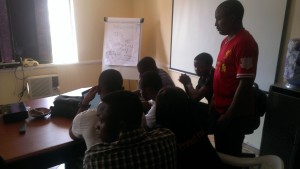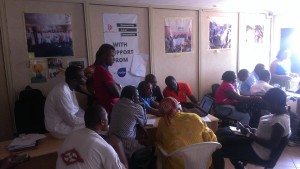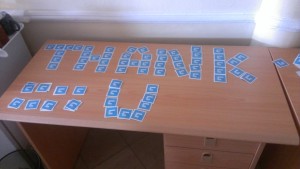May we Fetch you Some Data Skills? Exactly, at the Open Data Day in Abuja
olubabayemi - March 8, 2015 in Events
While everyone else whines about more training time for tools to can improve their data skills at our last open data party in Abuja, we did something about it at the Open Data Day in Abuja, on Saturday, February 21, 2015: 2 hours, 10 skill shares, 10 facilitators, 72 registered participants, and view the screenshot below to read what some of our participants said at the end of the event.
Tagged a skill share day that kicked off at 11a.m. it could not have been a wrong day to chose for this event, as 30 minutes before start of event, power was interrupted, and to make it worse, some part of the facility was going through renovation, Nevertheless, it began with an insanely charming activist from Devnovate/ Social Good Nigeria, Esther Agbarakwe, handing each of the participants a list of what to expect, and how the minutes are going to roll by in a flash – 2 hours will soon be over!
Surprisingly, the participants remain excited as we chose the first five skill shares that will run for the first hour (in a world cafe system). No thanks to our facilitators, who quickly had their laptops to run for next one hour without power. The skill shares for the hour were – Data Analysis using Excel Spreadsheet, Data Coding, using Google Spreadsheet for collaboration, Facilitation Skills and Community Building Skills. “It was quite intriguing to learn some simple skills around analysis with excel, been having headache around this all this while until this 15 minutes session” said one of the participants.
While the heat of the sun started settling in, it was quite obvious that the every 15 minutes change to another skill share for the participants became an exercise that will soon be gone. A new set of skill shares were introduced after 1 hour 15 minutes. “How come we already run through an hour and 15 minutes, that was in a dash” exclaimed Oladotun Fadeyiye. New skill shares included using infographics, using twitter for good, funding mechanisms, using ArCGIS for mapping, creating great blogging website.
Two hours fifteen minutes went by, and we were impressed at some of the ingenious ways our facilitators came up with, to teach without power! Did BRCK come to the rescue? No, not yet, it was a short time, so we got all laptops fully charged, so that by the time we finished, all laptops battery would be beeping. Internet came from shared sticks, and also I saw a facilitator using practically online screen shots for demonstration, making look like he was browsing – how intelligent!
As it was a short time, participants were instructed to scribble their questions on sticky notes, to be read at plenary, after the “party’ was over. We had questions like why is it important to code data, how can a stammer facilitate, how secured is it to share files with Google Doc, Can I use the Google Drive if I do not have a Gmail account. Had suggestions like can we more time for the skill share next time – like dedicating one hour to a particular topic, thus taking us to the advanced skills.
At the end of the event, despite the fact that I had to fix laptops battery that were running out, collect sticky notes, shared sweeties and stickers, make sure sugar and energy drinks were available, tried blowing out the heat from participants sweat, Little said I would make a great concierge. We kept our cool and bantered with participants, and have useful connections, admittedly largely at getting feed backs. When it is time for another data skill share, I will be prepared to serve. My first question is going to be whether participants miss their homes during the skill share hours ;)











